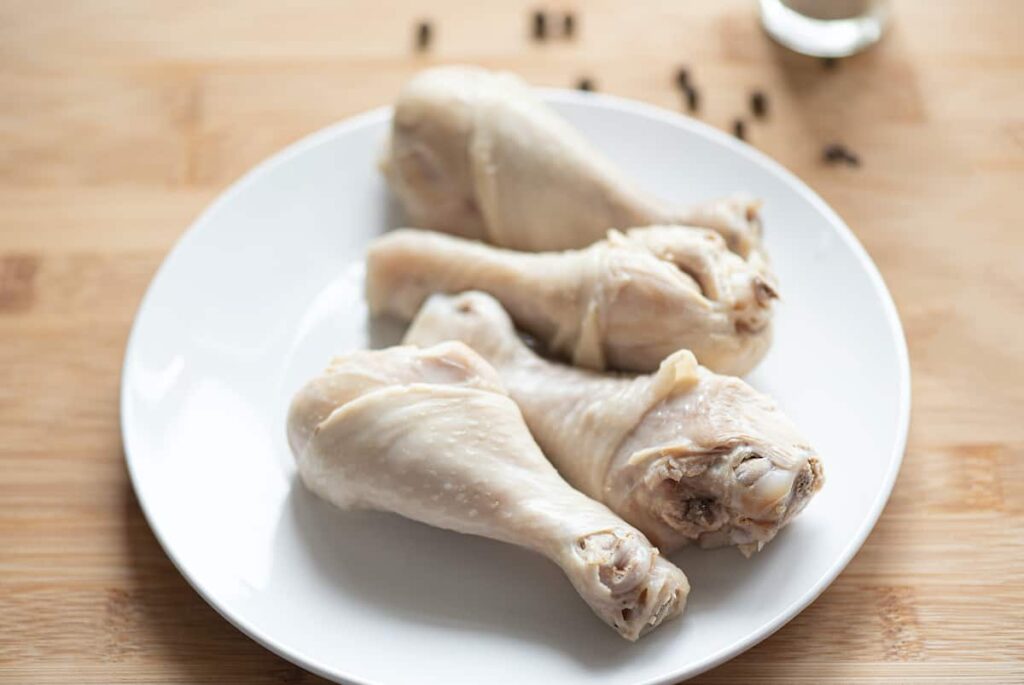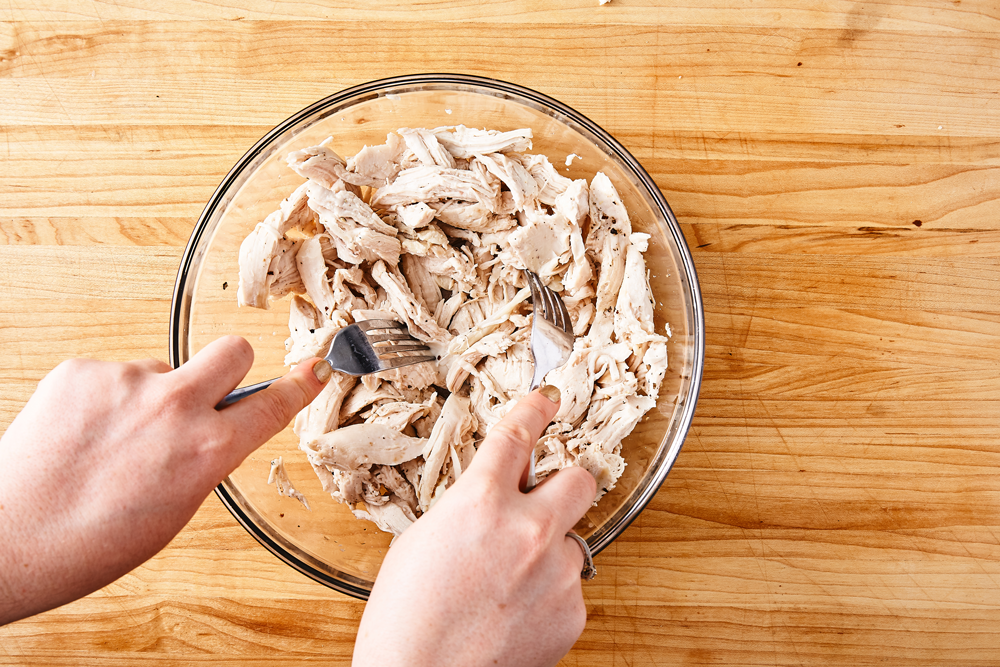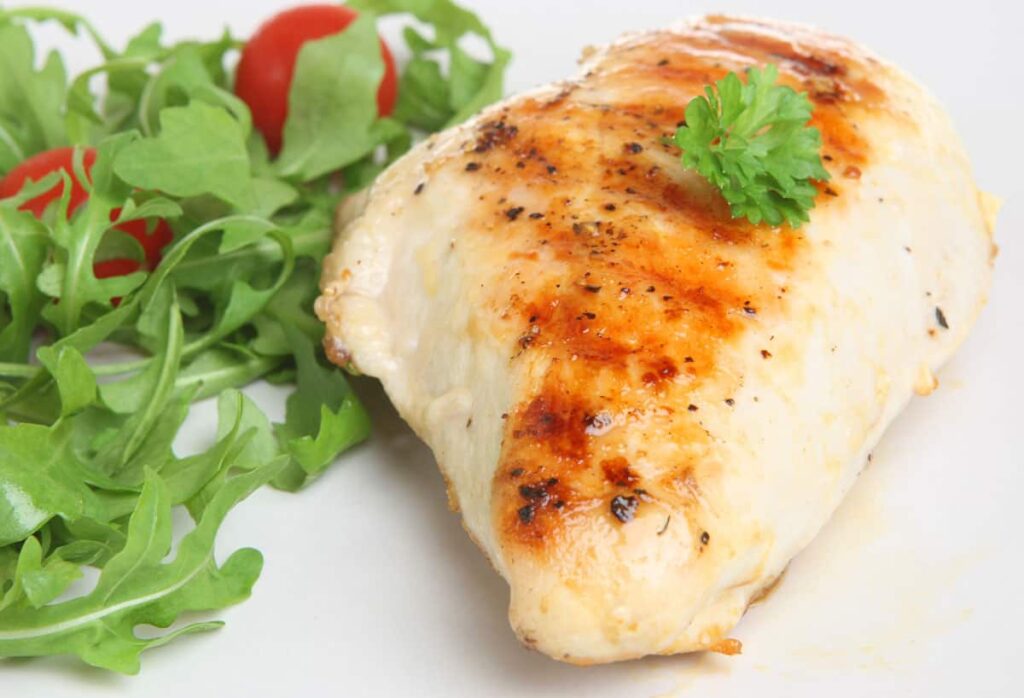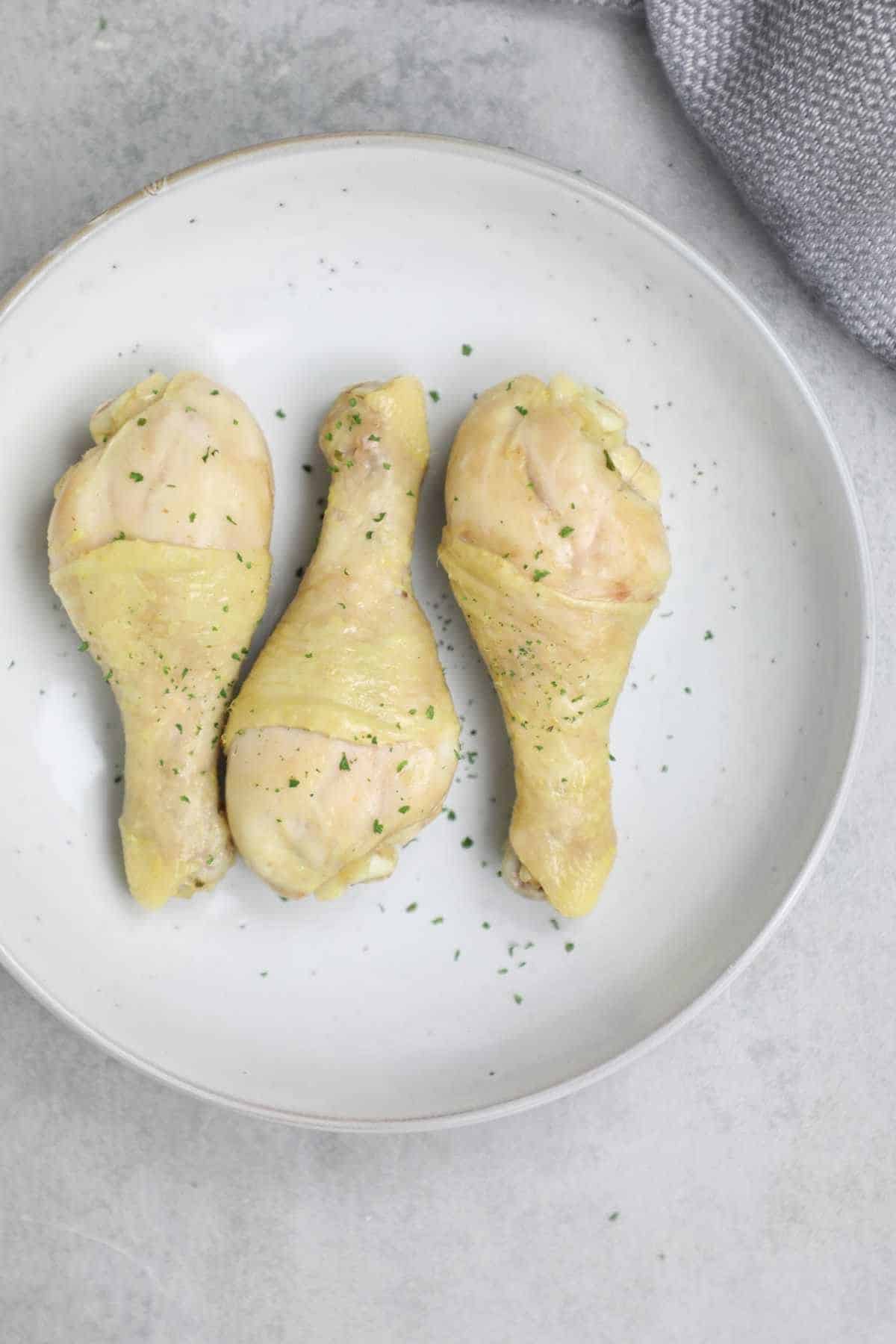You can boil chicken legs for about 25 minutes to make them tender.
The easiest way to cook chicken legs is by boiling them in water. This method is also the healthiest and safest mode of cooking chicken legs because it prevents bacterial contamination, which can be a problem with other cooking methods.
Cooking chicken legs in water also helps retain nutrients and makes the meat tender and juicy. The length of time you need to boil the chicken depends on its size and whether or not you want to use broth when cooking it.
How Long Can You Boil Chicken Legs?
Boiling is one of the most popular methods of preparing chicken because it’s easy and quick, especially if you’re making a large batch, which most people do for family dinners or parties. Cooks can also choose how long they want their chicken cooked based on personal preference — some like it well done, while others prefer their meat slightly pink inside.
A whole raw chicken leg weighs between 1/2 pound and 3/4 pound (about 225 grams). A whole raw bone-in thigh weighs approximately 1/3 pound (about 150 grams). The U.S Department of Agriculture recommends boiling whole raw bone-in thighs for 20 minutes at sea level; however,
Chicken legs are a great value and perfect for quick meals! You can boil chicken legs, roast chicken legs, grill chicken legs and even make fried chicken legs. No matter how you decide to cook them, they are always delicious.
How long to boil chicken? Boiling is one of the easiest ways to cook chicken. It’s also very forgiving; if you overboil the meat it will get tough, but if you undercook it will still taste good. To boil chicken legs:
Place the chicken into a large pot and cover with water. Add salt and spices if desired. Bring to a rolling boil over high heat (this will take about 5 minutes). Reduce heat to medium-high so that water continues to simmer but does not boil vigorously or foam up (this takes about 20 minutes). Remove from heat when desired temperature has been reached (for example, 170 degrees F for white meat or 180 degrees F for dark meat).How to boil chicken legs
Place the chicken in a large pot and cover with water. Bring to a boil over high heat. Reduce the heat, cover, and simmer until the meat is no longer pink near the bone, about 10 minutes per pound of chicken. Remove from the heat and let stand for 5 minutes before removing chicken from pot to cool slightly.
How long should chicken legs boil?

How long should chicken legs boil?
The answer depends on two things: how hot you want your chicken and how many people are eating. If you want to serve the chicken hot, boil for 10 minutes per pound. For example, a 3-pound chicken will take 30 minutes to cook. If you want to serve cold, boil for 12 minutes per pound.
How long should chicken legs roast?
If you’re roasting whole legs of chicken, allow 35 minutes per pound at 350 degrees Fahrenheit. For example, a 4-pound leg will need 130 minutes or 2 hours and 10 minutes in the oven at 350 degrees F.
How long does it take to boil chicken legs?
Chicken legs are very easy to cook. You can boil them in water with some spices or herbs if you like.
To get the best result, you should use a large pot with enough water and bring it to a boil before adding the chicken legs. If you are using whole chickens, cut them into pieces before boiling because they will cook faster this way. The same goes for chicken legs as well.
Cover your pot and let it simmer on low heat for about 1 hour or until the meat is cooked through.
The answer depends on your personal taste, but you can boil chicken legs for as long as 30 minutes if you’re looking for a tender, soft texture.
If you prefer meat with a more firm texture, however, you’ll want to limit the boiling time to 15 minutes or less. If you’re using a large stockpot, double this time to account for the fact that cold water takes longer to heat up than hot water does.
To ensure that your chicken legs are fully cooked through and through, use a meat thermometer to check the temperature of the meat in its thickest part. After boiling, it should register 165 degrees Fahrenheit (74 degrees Celsius).
The amount of time it takes to boil chicken depends on the size of the leg and its thickness. Here are some general guidelines:
Boneless, skinless chicken breast — 12 to 15 minutes per pound.
Bone-in chicken breasts — 25 minutes to 40 minutes per pound.
Boneless, skinless chicken thighs — 15 minutes per pound.
Bone-in chicken thighs — 20 minutes to 30 minutes per pound.
Boneless, skinless chicken wings — 8 to 10 minutes per pound.
Bone-in chicken wings — 12 to 18 minutes per pound
How do you know if boil chicken is done?
How do you know if boil chicken is done?
To test for doneness, use a meat thermometer. Insert it into the thickest part of the thigh, but not touching bone. The temperature should be 165°F (74°C). Also check with your finger – the juices should run clear. If not, cook for a little longer and check again.
How long does it take to boil chicken?
The cooking time will vary depending on the size of the bird, so use a meat thermometer to test for doneness. You can also use tip-toe method: insert a fork into the thickest part of the thigh, lift up and if juice runs clear, it’s cooked nicely!
What do you do with boiled chicken?
Freshly boiled chicken makes great chicken broth! It is also great in salads or sandwiches!
Chicken is done when it reaches an internal temperature of 165 degrees Fahrenheit. There are many ways to test for doneness in chicken, but the most common is to use a meat thermometer.
If you don’t have a meat thermometer and don’t want to spend money on one, there are other ways to determine if your chicken is done. The easiest way is by feel. You can do this by pressing down on the chicken with your thumb or finger (or both). If it feels squishy and soft, it’s not cooked all the way through. However, if it feels firm and springy when pressed down, it’s likely cooked through.
The best way to check if your chicken is done is to use a meat thermometer. Inserting it into the thickest part of the thigh or breast (without touching bone), cook until 165 degrees F has been reached, then remove from heat source and let rest for 5 minutes before carving or shredding into pieces.
The best way to tell if a whole chicken is done is by using a meat thermometer. Insert the thermometer into the thickest part of the thigh, but not touching the bone. The internal temperature should reach 170°F for well-done meat, 160°F for medium and 150°F for rare. If you don’t have a thermometer, you can judge doneness based on appearance and texture:
A whole chicken will be firm to the touch and feel heavy in your hand when you pick it up. The breast will look white (not pink) and should be cooked through.
The drumstick bone should move easily in its socket — if it doesn’t, cook the chicken longer.
How long does raw chicken take to boil?

How long does raw chicken take to boil?
How long does it take to cook chicken? It depends on the cut. The closer to the bone, the longer it takes to cook.
The boneless, skinless breasts take only 15 minutes or less to cook through. Thighs and drumsticks take about 20 minutes. A whole chicken takes 25-30 minutes.
If you’re cooking frozen chicken, add 10 minutes to these times.
When it comes to cooking chicken, there are a lot of different ways you can go about it. Whether it’s boiling, baking or frying, you’re going to have to cook it for a certain amount of time. How long does raw chicken take to boil? It depends on how you’re going to be cooking it, but we’ll get into that below.
When you’re boiling chicken, you’ll want to do so until the meat is no longer pink and has reached an internal temperature of 165 degrees Fahrenheit (74 C). This will ensure that any bacteria or germs that might be in the meat have been killed off and your family is safe from food poisoning.
If you’re baking your chicken, then you don’t need to worry too much about cooking times because the heat of the oven will kill any germs before they can make anyone sick. However, if you’re baking whole chickens or just pieces of them without any seasoning or marinade added in, then there’s a chance that they could still become contaminated with salmonella and other harmful bacteria even if they’ve been cooked thoroughly.
How long does it take to boil raw chicken?
The answer depends on the size of the chicken and how you intend to cook it. A whole chicken will take longer to boil than a cut-up one, because of the higher ratio of bone and skin to meat. And if you want to make a broth or stock from your boiled chicken, add even more time.
If you’re just boiling pieces of raw chicken for dinner tonight, then here’s how long it takes:
Boneless chicken breasts: 25 minutes (for 2/3 pound)
Bone-in chicken breasts: 30 minutes (for 2/3 pound)
Boneless thighs: 30 minutes (for 2/3 pound)
Can you over boil chicken?
The answer is yes, you can over boil chicken.
It’s not good for the chicken, and it will make your broth taste bad.
The process of boiling is one that removes the moisture from food. In this case, we’re talking about chicken breast meat. When you boil it for too long, you’ll end up with dry, rubbery chicken that doesn’t taste very good.
The best way to avoid overcooking your food is to use a timer when cooking in water (or any other liquid). The easiest way to do this is by setting your stove’s timer to go off when the water reaches a certain temperature. This will tell you when it’s time to take it off the heat so that you don’t overcook your food.
The short answer is yes, you can over boil chicken. The process of boiling food causes the water to evaporate and create steam. This steam helps cook your food from the inside out, which is why we use it all the time when cooking our meals.
But what happens when you take a piece of chicken and throw it into a pot of boiling water? Well, first let’s talk about what happens when you’re cooking with liquid.
When you throw a piece of meat into a pot of boiling water, it will release its juices into the water. As these juices come into contact with the boiling water, they raise the temperature of the water because they are warmer than room temperature (this is called thermal energy). When the temperature gets hot enough, those juices will start to boil themselves and create more steam.
Because there’s so much steam being created by your pot full of boiling liquid (and in this case, chicken), it starts to push against and press down on whatever is sitting in there with it — like your chicken! This pressure then starts to squeeze out even more juices from your meat until eventually all that’s left is dry bones (or in this case — no juices left).
You can over-boil chicken. Although it’s reasonably safe to cook chicken breasts in boiling water until they’re no longer pink in the center, you have to be careful not to overdo it. If the meat is boiled too long, it will become tough and dry.
Over-boiling is especially problematic if you’re using a pressure cooker, which cooks food faster than conventional methods. If you want to use your pressure cooker, follow the manufacturer’s instructions carefully and never exceed the maximum pressure level indicated by the pot.
If you end up with overcooked chicken, don’t worry — there are plenty of ways to salvage it. You can chop it up or shred it and use it in soups or salads, or add some flavor with seasonings like garlic powder or cayenne pepper.
What do you do with liquid after boiling chicken?
After boiling chicken, you need to let it cool, then remove the skin and bones. The next step is to strain off the broth:
1. Remove the cooked chicken pieces from the water, setting aside the cooked vegetables.
2. Strain the liquid through a sieve or colander lined with cheesecloth or a coffee filter into a large bowl or container; reserve 1 cup of the liquid for sauce if desired.
3. Discard the solids (bones and skin) in the strainer and wash them down your garbage disposal or drain them into your sink’s strainer basket.
The liquid that comes out of a boiled chicken is called “broth.” It’s rich in protein, minerals and vitamins.
You can use it as a base for soup or stew, or drink it plain.
If you don’t want to waste the broth, pour it through a strainer into another container. You may need to rinse out your pot with cold water first, so that none of the fat stays behind. Then strain out any remaining bits of meat and bones, or use a big spoon to scoop them out of the strainer.
Once you’ve strained the broth into another container, store it in the refrigerator for up to three days or freeze it for later use (up to six months).
Why is my chicken float when boiling?
When boiling, the water evaporates, so the chicken will float. As long as you don’t over-boil it, it should still be safe to eat.
The reason why chicken floats while boiling is because of the protein in its muscle tissue. When meat is heated, the proteins denature and become more porous. This allows water molecules to enter them more easily. As a result, they absorb water and expand in size.
While this is generally a good thing when cooking meat (it makes it juicier), it can make it difficult to tell if your meat has reached a safe temperature. This is because when meat expands beyond its size before cooking — such as when you boil it — it actually lowers its density (how heavy it feels) compared to raw meat; meaning that it will float instead of sink like raw chicken does in water.
The reason the chicken floats is because of the air in its cavity.
When you put a whole chicken in a pot of boiling water, it will float. This is because if you cut into it, there is air inside the cavity that is released when you cook it. The same thing will happen if you were to put a chicken breast in there as well.
However, if you were to cut out the insides of your chicken and then boil it, it would not float.
Why is my boiled chicken rubbery?

It’s a common question: Why is my boiled chicken rubbery?
The answer is that it’s the protein in the meat that causes this grainy texture. When you cook chicken breasts or thighs, the heat will cause some of the protein to coagulate and form strands. These strands will give your chicken a slightly chewy texture. When you boil chicken, you’re essentially cooking it in hot water, which speeds up this process even more.
If you want to avoid this problem, there are a few things you can try:
Use less liquid when boiling. The more water you have in the pot, the slower your meat will cook and become tender. So if you don’t have much time to spare for cooking dinner and want super-tender results, keep an eye on the water level and add more as needed so that it doesn’t evaporate too quickly.
Use less seasoning when boiling. Spices like salt and pepper will make your meat taste great after it’s done, but they can also make it tougher during cooking! If possible, avoid using any seasonings until after your chicken has finished cooking — at least 10 minutes after removing from heat — so they don’t interfere with its texture while it cooks
How do you keep boiled chicken from getting tough?
How do you keep boiled chicken from getting tough?
Boiled chicken can easily get dry and tough if it’s not cooked properly. Cooking it in enough water, for a long enough time and at the right temperature will help ensure that the meat is tender. If you’re cooking whole chicken pieces or chicken breasts, start by adding 2 tablespoons of salt to the pot of water. Bring the water to a boil and add the chicken pieces. Boil for 15 minutes per pound for whole pieces and 10 minutes per pound for breasts. Adding seasonings like vinegar or lemon juice helps tenderize the meat further, as does simmering it in broth after cooking.
